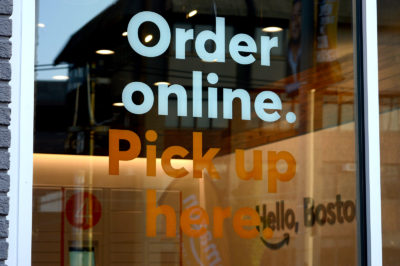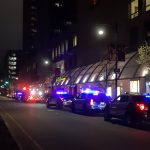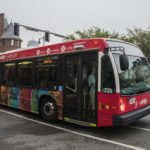
Boston unveiled its bid to house Amazon’s second North American headquarters on Friday, joining cities and regions — such as Worcester and New Hampshire — across the United States and Canada in a battle for the company’s investment.
The City’s proposal centers around Suffolk Downs in East Boston, and would add 50,000 jobs to the economy over 15 years, Boston Mayor Martin Walsh told The Daily Free Press at an event in Charlestown Thursday. Walsh said Amazon is looking for a place close to the airport, accessible to public transportation and near the highway — all of which the Suffolk Downs location can offer.
Suffolk Downs consists of 161 acres of contiguous land, including a new mixed-use Suffolk Downs neighborhood which will house Amazon office space, five hotels and street front retail, according to the proposal.
Boston’s initial proposal does not include any financial incentives, a decision that was made because Amazon did not explicitly ask for them, Walsh said.
“You don’t want to be showing too early what you’re willing to do,” Walsh said. “I think eventually, depending on whoever’s in the final round here with Amazon, there will be more of a negotiation with them.”
Walsh added that Boston has much more to offer Amazon than financial incentives.
“The brain power we have in our city, I think about the colleges and universities, I think those are incentives for Amazon to come here,” Walsh said. “So there’s other incentives besides monetary incentives.”
Michaele Morrow, an associate professor of accounting at Suffolk University, said Boston will still likely end up offering Amazon some kind of economic breaks.
Morrow said it’s interesting to look at the ways in which different cities are approaching Amazon with incentives in their proposals.
“It’s a relatively new thing to basically be courting these specific firms city by city, submitting these bids,” Morrow said.
Richard Taylor, director of the Center for Real Estate at Suffolk University, said Boston has a lot of what Amazon is looking for in a second headquarters, including the core of an innovative city.
“We [in Boston] certainly have plenty of trained and soon-to-be-trained to assume some of the jobs,” Taylor said. “There is just a lot of intellectual and financial power in and around Boston.”
Suffolk University chair and professor of information systems and operations management Ken Hung said Amazon would be able to leverage strong research connections with Boston area universities in fields that are important to the company.
“[If Amazon] should come to Boston, I would expect to see an increase in education and research collaboration, potentially resulting in a research park particularly in areas of artificial intelligence machine learning, logistics [and] retail research,” Hung said.
While the Suffolk Downs area offers plenty of room for growth as Amazon would develop, Hung said, there are likely to be transportation consequences down the road.
“There will be increasing burdens on existing infrastructure, congestion on the route way, potential congestions at the airport,” Hung said. “Logan [Airport] is already very busy, and Logan actually does not have much room to expand.”
Paul Morano, the assistant chief development officer of Worcester, said the City has also placed a bid, competing with Boston for HQ2. The City has already offered $500 million in incentives to Jeff Bezos’ company.
Those incentives include a release on real estate taxes as well as a personal property tax exemption, Morano said. Beyond exemptions, Morano said, Worcester has a lot to offer Amazon.
“The [proposed] site’s got incredible highway access, the commuter rail goes right past it, there’s a very highly educated workforce in Worcester and in the region,” Morano said. “We have colleges that can compete with everybody.”
New Hampshire has also placed a bid in an attempt to win Amazon’s favor for HQ2, drawing upon the “benefits of Boston without all the headaches,” according to the proposal.
The benefits of the state — which has submitted Woodmont Commons as the site for HQ2 — include the workforce, a pro-business and low tax environment, a high quality of life and the positives of a major metropolitan region without the issues affecting Boston like affordability and commute time, according to the proposal.
Boston residents expressed varying opinions on the city’s bid for Amazon’s headquarters.
Eddie Deveau, 64, of East Boston, said he thinks Suffolk Downs is an ideal location for HQ2, though there would need to be infrastructure development.
“I would like to see, one, Suffolk Downs be used for such a productive venture,” Deveau said. “And I would like to see Amazon go there because … it would really be a shot in the arm for the neighboring towns … as far as jobs are concerned.”
Addie Cooper, 68, of Back Bay, said that she is in favor of the proposal for HQ2 so long as there is an accompanying economic benefit for the city.
“Really what got my interest [in the proposals] was the economy, for jobs,” Cooper said. “So I would say for that reason, I would support it if it would help boost the economy and create jobs.”
Rich Holman, 53, of Brighton, said Amazon could put Suffolk Downs to good use, though he is hesitant about the real impacts of the project.
“I’m not sure about the benefits to the actual residents of the area,” Holman said. “But it sounds like Amazon is going to get a good deal no matter where they decide to go.”
Shaun was the Editor-in-Chief for the Spring 2019 semester. Before that, he was the Multimedia Editor, the Layout Editor and a News writer. He also sat on the Board of Directors. Follow him on Twitter @shaun_robs.














